大学英语六级翻译练习(含时态,语态,虚拟语句等--总之很全)1_百度文库...
英语六级考试翻译模拟题附参考译文
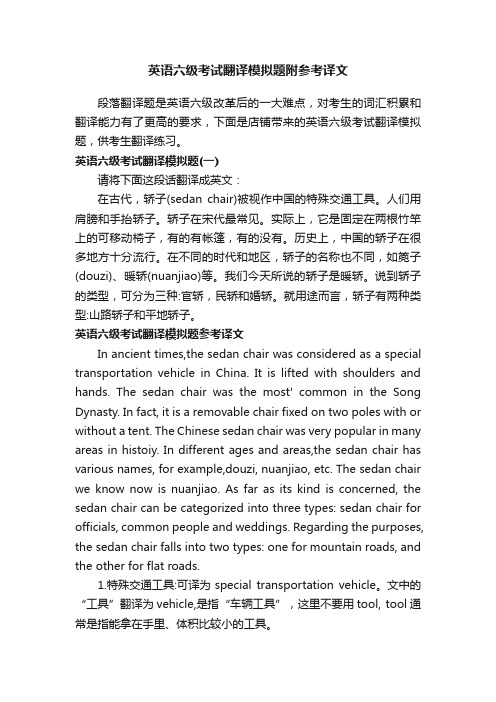
英语六级考试翻译模拟题附参考译文段落翻译题是英语六级改革后的一大难点,对考生的词汇积累和翻译能力有了更高的要求,下面是店铺带来的英语六级考试翻译模拟题,供考生翻译练习。
英语六级考试翻译模拟题(一)请将下面这段话翻译成英文:在古代,轿子(sedan chair)被视作中国的特殊交通工具。
人们用肩膀和手抬轿子。
轿子在宋代最常见。
实际上,它是固定在两根竹竿上的可移动椅子,有的有帐篷,有的没有。
历史上,中国的轿子在很多地方十分流行。
在不同的时代和地区,轿子的名称也不同,如篼子(douzi)、暖轿(nuanjiao)等。
我们今天所说的轿子是暖轿。
说到轿子的类型,可分为三种:官轿,民轿和婚轿。
就用途而言,轿子有两种类型:山路轿子和平地轿子。
英语六级考试翻译模拟题参考译文In ancient times,the sedan chair was considered as a special transportation vehicle in China. It is lifted with shoulders and hands. The sedan chair was the most' common in the Song Dynasty. In fact, it is a removable chair fixed on two poles with or without a tent. The Chinese sedan chair was very popular in many areas in histoiy. In different ages and areas,the sedan chair has various names, for example,douzi, nuanjiao, etc. The sedan chair we know now is nuanjiao. As far as its kind is concerned, the sedan chair can be categorized into three types: sedan chair for officials, common people and weddings. Regarding the purposes, the sedan chair falls into two types: one for mountain roads, and the other for flat roads.1.特殊交通工具:可译为special transportation vehicle。
历年英语6级真题翻译及答案(含2010年6月)
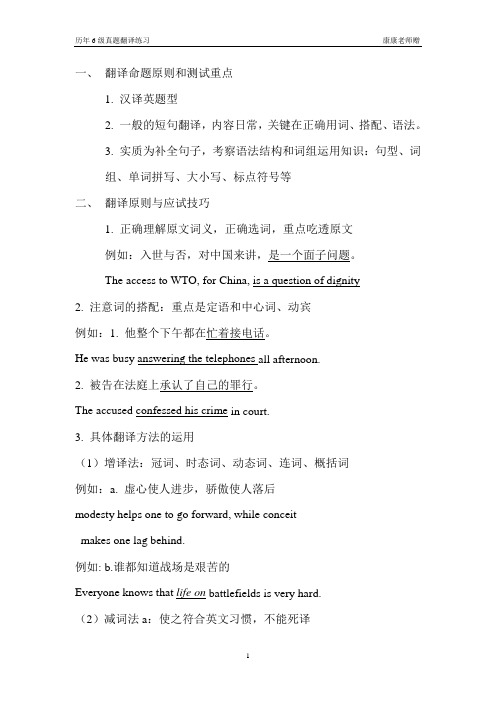
一、翻译命题原则和测试重点1. 汉译英题型2. 一般的短句翻译,内容日常,关键在正确用词、搭配、语法。
3. 实质为补全句子,考察语法结构和词组运用知识:句型、词组、单词拼写、大小写、标点符号等二、翻译原则与应试技巧1. 正确理解原文词义,正确选词,重点吃透原文例如:入世与否,对中国来讲,是一个面子问题。
The access to WTO, for China, is a question of dignity2. 注意词的搭配:重点是定语和中心词、动宾例如:1. 他整个下午都在忙着接电话。
He was busy answering the telephones all afternoon.2. 被告在法庭上承认了自己的罪行。
The accused confessed his crime in court.3. 具体翻译方法的运用(1)增译法:冠词、时态词、动态词、连词、概括词例如:a. 虚心使人进步,骄傲使人落后modesty helps one to go forward, while conceitmakes one lag behind.例如: b.谁都知道战场是艰苦的Everyone knows that life on battlefields is very hard.(2)减词法a:使之符合英文习惯,不能死译例如:中国足球的落后状态必须改变。
The (state/condition of) backwardness of the Chinesefootball must be changed.总结:汉语中的范畴词在英文中往往省略,用英文中相应的抽象名词翻译,常考范畴词为:谦虚态度:modesty 发展过程:development残暴行为:brutality 同情心理:sympathy悲伤情绪:sadness 无知表现:innocence稳定性: stability 灵敏度:sensibility防爆措施:anti-violence 同化作用:assimilation(3)转换词性:重点是动词派生词、介词和副词例如a:看到喷气式飞机令我非常向往。
大学英语六级翻译练习(含时态_语态_虚拟语句等--总之很全)1

大学英语六级翻译练习(含时态_语态_虚拟语句等--总之很全)1精选英语翻译题集训1.I have had great deal of trouble______________________________.(跟得上班上的其他同学) 2.___________(我们没有人料到主席会出现) at the party. We thought he was still in hospital.3. A good many proposals were raised by the delegates,________________(正如预料的那样).4. Most doctors recognize that medicine is as much__________(是一门科学,也是一门艺术).5. Some women ___________________(本来能够挣一份很好的工资) in a job instead of staying home, but they decided not to work for the sale of the family.6.Over a third of the population was estimated_________(无法获得) to the health service.7. Although punctual himself, the professor was quite used______________(习惯了学生迟到) his lecture.8. The price of beer____________(从50美分到4美元不等) per liter during the summer season.9.We'd like __________________(预订一张餐桌) five for dinner this evening.10. There's a man at the reception desk who seems very angry and I think he means____________(想找麻烦). 24411. It may be necessary to stop__________________________(每隔...时间) in the learning process and go back to the difficult points in the lessons.12. The mad man was put in the soft-padded cell lest he ______________(伤害自己).13.Jean did not have time to go to the concert last night because she was_______________(忙着准备) her examination.14. The ship's generator broke down and the pumps____________________(不得不用手工操作) instead of mechanically.15. Why didn't you tell me you could me the money? I___________________________ (本来不必从银行借钱的) 221 16.By the time you get to New York, I____________(已经动身去) London.17. Buying clothes______________________(是一件很耗时的工作), because those clothes thata person likes are rarely the ones that fit him or her.18. It's time_____________________(采取措施) about the traffic problem downtown.19. When I was very young, I was terribly frightened of school, but I soon______________(克服了这种心理).20. Please don't stand in the kitchen, you're________________(挡路了). 197 21.There was a knock at the door. It was the second time someone ____________(打扰我) that evening.22._____________________(正是由于她太没有经验) that she does not know how to deal with the situation.23.When I __________________(发现他骗我) I stopped buying thins there and started dealing with another shop.24. The manager would rather his daughter__________________(不在一个办公室内工作).25. The sports meet originally due to be held last Friday_______________(最终因天气不好而取消了). 17326.I__________________(将在做实验) from three to five this afternoon.27. How close parents are to their children___________________(有很强的影响) the character of the children.28. But for his help, I _____________________(我不可能这么早完成).29. His remarks left me ____________________________(想知道他的真实目的).30. Mark often____________________________(试图逃脱罚款) whenever he breaks traffic regulations.31.If this can't be settled reasonably, it may be necessary to______________(诉助武力).32. The room is in a terrible mess; it _____________________(肯定没打扫过).33. Everybody knows he____________________________(受到了冤枉指控).34. He wears a pair of sunglasses________________________(惟恐被别人认出来).35. She never dreams of _______________________(被派到国外). 12436. If you won't agree to our plan,_____________________(他们也不会同意).37. I should say Henry is _______________________(与其说是个作家不如说是) as a reporter.38. _____________________(信不信由你), his discovery has created a stir in scientific circles.39. If you don't like to swim, you ____________(不妨待在家里).40. Please be careful when you are drinking coffee in case you____________________(弄脏了新地毯). 10041.Frankly speaking, I'd rather you ________________(不采取任何措施) about it for the time being.42. In the Chinese household, grandparents and other relatives_____________(起着不可缺少的作用) in raising children.43. John seems a nice person, ___________________(即使这样), I don't trust him.44. The fifth generation computers, with artificial intelligence,_____________(正在研制) and perfected now.45. What a lovely party! It's worth_________________(牢记一生).7646.Though you stay in the sea for weeks, you will not____________(失去联系) the outside world.47. Cancer is _________________(仅次于) heart disease as a cause of death.48. It is a pity that we should stay at home when we have ______________(这么好的天气).49. I would ______________(不会诉诸法律) a court of law if I hadn't been so desperate.50. John cannot afford to go to the university, _________________(更不用说出国了). 51.I don't mind your_____________(你延期做出决定) the decision as long as it is not too late.52. I suggested he ____________________(使自己适应)his new conditions.53. I have no objection_______________________(再听听你的故事).54. This popular sports car___________________(正在生产出来)out at the rate of a thousanda week.55. _____________________________ (请你找张空白纸)and write your name at the top? 参考答案:1. keeping up with the rest of the class.2. none of us expected the chairman to turn up3. as was to be expected4. an art as it is a science5. could have made a good salary.6. to have no access7. to students' being late for8. ranges/varies from 50 cents to $49. to reserve a table for10. to make trouble11. at intervals12. injure himself13. busy preparing for14. had to be operated manually15. needn't have borrowed it from the bank.16. shall have left for17. is often a very time-consuming job18. something was done/some measures were taken19. overcame it/got over it20. in the way 21. had interrupted me22. it is because she is too inexperienced23. caught him cheating me24. did not work in the same office25. was finally called off/cancelled because of the bad weather26. will be doing/conducting the experiment27. has a strong influence on 28. would not have finished so early29. wondering about his real purpose30. attempts to escape being fined31. resort to force32. can't have been cleaned33. was wrongly accused/charged34. for fear that he should be recognized35. being sent abroad36. neither will they37. not so much a writer38. Believe it or not39. may just as well stay at home40. stain the new carpet41. didn't do anything42. play indispensable roles43. Even so44. are being developed45. remembering all my life46. lose contact with 47. second only to48. such fine weather49. have never resorted to 50. not to speak of/not to mention/let alone going abroad51. delaying making52. should adapt himself to 53. to hearing your story again54. is now being turned 55. Could you take a blank sheet of paper?必背翻译句型1.All that is needed is a continuous supply of the basic necessities of life.2.After being interviewed for the job, you will be required to take a language test.3.Nuclear science should be developed to benefit the people rather than harm them.4.They usually have less money at the end of the month than they have at the beginning.5.Helen was much kinder to her youngest child than she was to the others, which, of course, made the others jealous.6.No matter how frequently performed, the works of Beethoven always attract large audiences.7.Only under special circumstances are freshmen permitted to take make-up tests.8.The pressure to compete causes Americans to be energetic, but it also puts them undera constant emotional strain.9.Your ha ir wants cutting,. You’d better have it done tomorrow.10.Other things being equal, a man who expresses himself effectively is sure to succeed more rapidly than a man whose command of language is poor.11.Homework done on time will lead to better grades.12.Had it not been for my illness I would have lent him a helping hand.13.Realizing that he hadn’t enough money and not wanting to borrow from his father, he decided to sell his watch.14.The fifth generation computers, with artificial intelligence, are being developed and perfected now.15.Published as it was at such a time, his work attracted muchattention.16.I have kept that portrait where I can see it every day, as it always reminds me of my university days in London.17.Believing the earth to be flat, many feared that Columbus would fall off the edge of the earth.18.As might be expected, the response to the question was very mixed.19.After the Arab states won independence, great emphasis was laid on expanding education, with girls as well as boys being encouraged to go to school.20.You see the lightning the instant it happens, but you hear the thunder later.大学英语六级翻译练习(含时态,语态,虚拟语句等--总之很全)大学英语六级考试CET6中翻译共有5句话。
英语六级考试翻译练习带范文
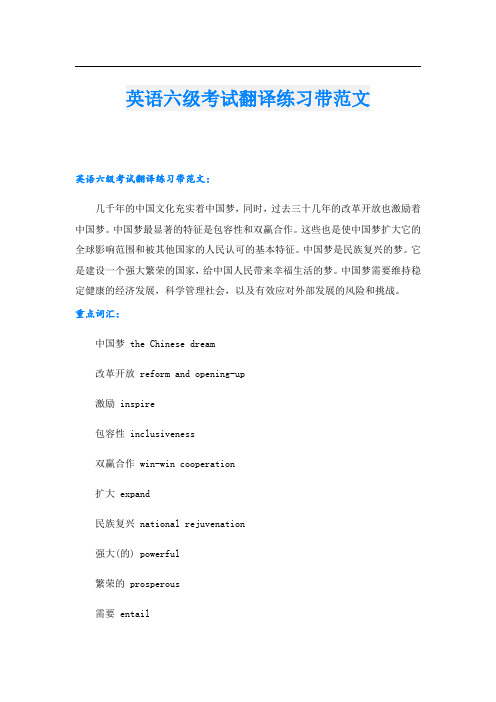
英语六级考试翻译练习带范文英语六级考试翻译练习带范文:几千年的中国文化充实着中国梦,同时,过去三十几年的改革开放也激励着中国梦。
中国梦最显著的特征是包容性和双赢合作。
这些也是使中国梦扩大它的全球影响范围和被其他国家的人民认可的基本特征。
中国梦是民族复兴的梦。
它是建设一个强大繁荣的国家,给中国人民带来幸福生活的梦。
中国梦需要维持稳定健康的经济发展,科学管理社会,以及有效应对外部发展的风险和挑战。
重点词汇:中国梦 the Chinese dream改革开放 reform and opening-up激励 inspire包容性 inclusiveness双赢合作 win-win cooperation扩大 expand民族复兴 national rejuvenation强大(的) powerful繁荣的 prosperous需要 entail稳定健康的 steady and healthy应对 respond to外部发展 external development风险 risk挑战 challenge译文内容:The Chinese dream has been enriched by thousands of years of Chinese culture and inspired among other things by the past three decades of reform and opening-up. The most noticeable features of the Chinese dream include inclusiveness and win-win cooperation. These are the very features that will enable the Chinese dream to expand its global reach and be recognized by people of other nations. The Chinese dream is the dream of national rejuvenation. It is the dream of building a powerful and prosperous state, a dream of bringing happiness in the lives of the Chinese people. It entails sustaining steady and healthy economic growth, scientifically managing the Chinese society, and effectively responding to the risks and challenges of external development.英语六级考试翻译练习带范文:最近,一些地方大学开始将方言列为某些学生的必修课程,学生们要学习当地方言,然后被评分以作为毕业的依据之一。
四六级翻译题例题及答案

四六级翻译题例题及答案四六级翻译题例题及答案1、Because she knew French, she (比我们有利).2、It’s important that the librarian (确认图书按时归还).3、The regulations doesn’t(生效) until the first of March.4、My mother wanted me to(从事教育工作).5、After arriving at your new university, the following may assist you in(减轻文化冲击所带来的'紧张感).1、答案:had an advantage over the rest of us解析:1)词组:have an advantage of(比…有利)2)时态:根据前半句的knew,此处应使用一般过去时2、答案:make sure the books (should) be returned in time解析:1)从句:主语从句it is important that …2)虚拟语气:此处主语从句应使用should + 动词原形,should 可以省略3)语态:此处“按时归还”应使用被动语态be returned4)词组:make sure(确认)3、答案:come/go into effect解析:词组:come/go into effect(生效)4、答案:go in for teaching解析:词组:go in for(从事)5、答案:reducing the strain of cultural shock解析:1)动名词:assist somebody in doing something2)词组:cultural shock(文化冲击)。
大学英语六级考试翻译习题及参考译文

大学英语六级考试翻译习题及参考译文导读:我根据大家的需要整理了一份关于《大学英语六级考试翻译习题及参考译文》的内容,具体内容:翻译题是大学六级考试中的难点题型,得分难度大需要考生平时加强翻译训练。
下面是我带来的大学英语六级考试翻译习题,供考生翻译练习。
大学英语六级考试翻译习题(一)请将下面这段...翻译题是大学六级考试中的难点题型,得分难度大需要考生平时加强翻译训练。
下面是我带来的大学英语六级考试翻译习题,供考生翻译练习。
大学英语六级考试翻译习题(一)请将下面这段话翻译成英文:雷锋常常帮助他人,是中国人民解放军(the Peoples Liberation Army)的模范士兵。
他捐钱给贫困家庭,挽救普通人的生命,为战友洗衣服,常以各种方法帮助别人。
雷锋倾其一生帮助他人。
雷锋牺牲后,毛主席号召人们"向雷锋同志学习"。
中国人民了解雷锋,并以他为榜样,雷锋精神永远活在人们心中。
自1963年起,每年的三月五日被定为"雷锋日"(Lei Fengs Day)。
雷锋精神已经影响了好几代中国人。
虽然社会迅猛发展,但雷锋精神将继续在中国社会发挥重要作用。
大学英语六级考试翻译习题参考译文Lei Feng was a model soldier of the Peoples Liberation Army who always helped others.He gave money to poor families, saved the lives of many ordinary people, washed clothes for his comrades and oftenhelped others in many other ways.Lei Feng has devoted his entire life to helping others.After he died, Chairman Mao called people to "learn from Comrade Lei Feng".The spirit of Lei Feng has lived on among Chinese people, who know and respect him as an idol.March 5th has been observed as "Lei Fengs Day" every year since 1963.The Lei Feng spirit has influenced several generations ofChinese.Despite the rapid social development, Lei Feng spirit will continue to play a significant role in Chinese society.1.雷锋常常帮助他人,是中国人民解放军的模范士兵:中文把"常常帮助他人"放在前面,翻译时可以调换顺序,先指明身份,即"模范士兵",再使用定语从句进行描述。
英语六级翻译习题(有答案)
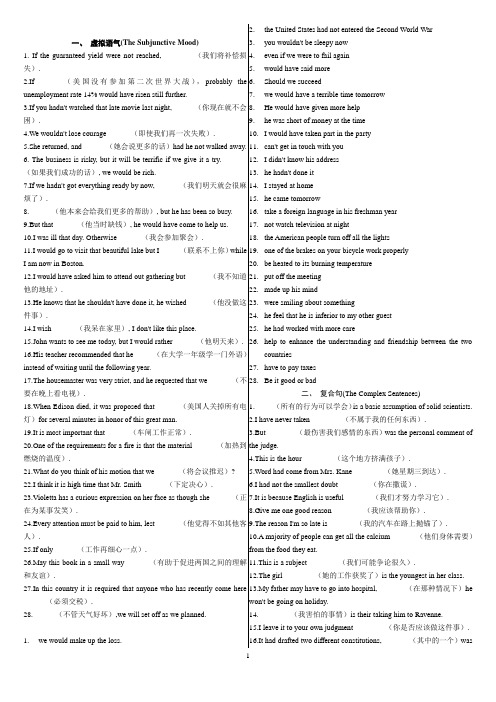
一、 虚拟语气(The Subjunctive Mood)1. If the guaranteed yield were not reached, ________(我们将补偿损失).2.If ______(美国没有参加第二次世界大战),probably the unemployment rate 14% would have risen still further.3.If you hadn't watched that late movie last night, ______(你现在就不会困).4.We wouldn't lose courage ______(即使我们再一次失败).5.She returned, and ______(她会说更多的话)had he not walked away.6. The business is risky, but it will be terrific if we give it a try. ______(如果我们成功的话), we would be rich.7.If we hadn't got everything ready by now, ______(我们明天就会很麻烦了).8.______(他本来会给我们更多的帮助), but he has been so busy. 9.But that ______(他当时缺钱), he would have come to help us. 10.I was ill that day. Otherwise ______(我会参加聚会). 11.I would go to visit that beautiful lake but I______(联系不上你)while I am now in Boston. 12.I would have asked him to attend out gathering but ______(我不知道他的地址). 13.He knows that he shouldn't have done it, he wished ______(他没做这件事).14.I wish ______(我呆在家里), I don't like this place.15.John wants to see me today, but I would rather ______(他明天来). 16.His teacher recommended that he______(在大学一年级学一门外语)instead of waiting until the following year. 17.The housemaster was very strict, and he requested that we ______(不要在晚上看电视).18.When Edison died, it was proposed that ______(美国人关掉所有电灯)for several minutes in honor of this great man. 19.It is most important that ______(车闸工作正常). 20.One of the requirements for a fire is that the material ______(加热到燃烧的温度).21.What do you think of his motion that we ______(将会议推迟)? 22.I think it is high time that Mr. Smith ______(下定决心). 23.Violetta has a curious expression on her face as though she ______(正在为某事发笑). 24.Every attention must be paid to him, lest ______(他觉得不如其他客人).25.If only ______(工作再细心一点). 26.May this book in a small way ______(有助于促进两国之间的理解和友谊).27.In this country it is required that anyone who has recently come here ______(必须交税).28.______(不管天气好坏),we will set off as we planned.1. we would make up the loss.2. the United States had not entered the Second World War3. you wouldn't be sleepy now4. even if we were to fail again5. would have said more6. Should we succeed7. we would have a terrible time tomorrow 8. He would have given more help9. he was short of money at the time 10. I would have taken part in the party11. can't get in touch with you 12. I didn't know his address 13. he hadn't done it 14. I stayed at home15. he came tomorrow16. take a foreign language in his freshman year 17. not watch television at night18. the American people turn off all the lights 19. one of the brakes on your bicycle work properly 20. be heated to its burning temperature 21. put off the meeting22. made up his mind23. were smiling about something24. he feel that he is inferior to my other guest 25. he had worked with more care26. help to enhance the understanding and friendship between the two countries27. have to pay taxes28. Be it good or bad二、 复合句(The Complex Sentences)1. _____(所有的行为可以学会)is a basic assumption of solid scientists.2.I have never taken _______ (不属于我的任何东西).3.But _______ (最伤害我们感情的东西)was the personal comment of the judge.4.This is the hour _______ (这个地方挤满孩子).5.Word had come from Mrs. Kane _______ (她星期三到达).6.I had not the smallest doubt _______ (你在撒谎).7.It is because English is useful _______(我们才努力学习它).8.Give me one good reason _______ (我应该帮助你).9.The reason I'm so late is _______(我的汽车在路上抛锚了).10.A majority of people can get all the calcium _______(他们身体需要)from the food they eat.11.This is a subject _______ (我们可能争论很久).12.The girl _______ (她的工作获奖了)is the youngest in her class. 13.My father may have to go into hospital, _______(在那种情况下)hewon't be going on holiday.14. _______ (我害怕的事情)is their taking him to Ravenne. 15.I leave it to your own judgment _______ (你是否应该做这件事). 16.It had drafted two different constitutions, _______(其中的一个)wasnever put in force.17.We are in a position _______ (我们可能失去一大笔钱).18.Perhaps it will be a long time _______(汤姆从国外回来).19.The business would be a success,_______ (无论谁拥有它).20.Through long power lines electricity goes _______ (需要它的地方).21. _______ (他们是否会派代表出席会议)is not yet known, but we hope they will.22.Then I discovered, _______ (对我来说是新闻的东西), that his wife was Paleiret's niece.23.They were the Boy Scouts _______(他们的任务是帮助老人穿过马路).24.He was the only friend I made during the four years _______ (我上大学).25.There was much certainly _______(委员会会同意这个项目).26.Does British foreign policy remain the same_______ (无论哪个政党执政)?27.We drove out of the town by the same road _______ (我们进城时走的路).1.That all behavior can be learned2. anything that didn't belong to me3. what hurt our feelings most4. when the place is always full of children5. that she would arrive on Wednesday6. that you were telling a lie7. that we study it hard8. why I should help you9. that my car broke down on the way10. that their bodies require11. about which we might argue for a long while12. whose work got the prize13. in which case14. What I am afraid of15. whether you should do it16. one of which17. where we may lose a large sum of money18. before Tome comes back from aboard19. whoever owned it20. where it is needed21. Whether they will send a representative to the conference22. what was news to me23. whose task was to help elderly people cross the street24. when I was at university25. that the committee would agree to my object26. whichever party is in power27. as we had entered by三、非谓语动词(The Non-finite Verbs) 1.The teacher ______(在忙着做算术题)upon the blackboard.2.His handwriting is very bad, so I have much trouble ______(阅读他的信).3.It is heartening to see millions who had nothing but a record of misery and hunger ______(有机会改进生活).4.All these worries made it impossible ______(她专心致志于她的工作).5.______(在随后的演讲中)she will give us some information about the situation in Africa.6.What's troubling them is their _______ (没有足够的设备).7.You are cordially invited to a party ______(我们学院举办的)at 1:30 p.m.Dec.2.8.The farmer caught ______(孩子们偷他的苹果).9. Not ______(做好充分的准备), they thought it better to postpone the excursion till next week.10.Peter developed a method for bringing substances to the lowest temperatures _______(现代科学所知的).mercial banks make most of their income from ______(在贷款和投资上获得的利息)in stocks and bonds.12.Waves generally result from ______(作用在水上的风).13.The speaker was booed for his proposal, and that was certainly not _______(预期的反应).14.They failed to pass the exam last time. I regretted _______ (没有能够帮助他们).15.I'd appreciate _______ (你寄来这些信).16. _______(在那种环境中被抚养成人), Harriet demonstrated an interest in theology at a young age.17.By taking the back way he escaped _______ .(发现偷钱)18.When _______(从地平线附近看), the Moon appears strikingly larger.19.The whole group took part in the discussions, each member_______(有责任)of leading one meeting.20.“I can't see the blackboard very well.”“Perhaps you need _______(检查眼睛).”21. _______ (把木质建筑物刷上漆)helps to protest them from damage due to weather.22.“Have you found the lost car?”“It was found _______ (抛在路边).”23.If the project _______(年底完成的)is delayed, our unit will be fined.e back on Monday; it is no good _______ (在此之前来).25.Now I can manage to make myself _______ (说你们的语言而别人理解).26. _______(收到答复后), he decided to write another letter to them.27. _______(众目睽睽之下), he felt too nervous to speak,28.We do not permit _______ (在办公室抽烟). So we do not ______(允许他在这里抽烟).29.Weather _______(许可), we shall go skating tonight.30.They were two small gatherings, each ______(有一些学生参加).31.Wind and rain continually hit against the surface of the Earth, _______(击碎大块岩石)into smaller and smaller particle.32.All we can do is try _______(使他认识到)that he ought to study more.33.My watch has been losing time for the past week. It probably needs _______ .(清洗)34.The guests _______(离开宾馆),they resumed their discussion.35.Whenever my mother washes her clothes, she often asks if I _______(有要洗的衣服).36. _______(要解释社会的任何方面)the sociologist must determine the laws influencing human behavior in social contexts.37.The photographer thought he was supposed to arrive after the guests, but I meant _______ (他早点来).38.By 1871 there were 6,000 telegraph stations in the United States, _______ (全部根据这个系统工作).1. was busy working out sums2. reading his letter3. have the chance to improve their life4. for her to concentrate on her work5. In the lectures to follow6. not having enough machine tools7. to be given at our institute8. the boys stealing his apples9. having made adequate preparations10. known to modern science11. interest earned on loans and investments12. wind acting on water13. the anticipated response14. being unable to help15. your mailing these letters16. Raised in that atmosphere17. being seen taking the money18. seen near the horizon19. having the responsibility20. to have your eyes examined21. Painting wooden buildings22. abandoned off the highway23. to be finished by the end of the year24. coming before that25. understood in your language26. Having received an answer27. Being watched by a crowd of people28. smoking in the office,permit him to smoke here29. permitting30. attended by some students31. breaking large rocks32. to make him realize33. cleaning34. having left the hotel35. have any clothes to wash 36. To explain any aspect of society37. for him to come early38. all working on this system四、主谓一致(The Agreement Between The Subject and The Predicate)1.An iron and steel works, together with some satellite factories, _______ (将在这里修建).2.Mr.Smith, along with his wife and two sons, _______ (刚刚离开)and will return at four o'clock.3.That intelligence tests actually give a measurement of the intelligence of individuals _______ (受到一些学者的怀疑).4.What his father left him _______ (只是几件破衣服).5.After a careful inspection the manager came to the conclusion that only two-thirds of the available machinery _______ (在使用)efficiently.6.More than one person _______(卷入这个案件).7.Many a ship _______ (在这些岩石上搁浅).8.In Naples the number of illiterates _______ (超过人口的百分之六十).9.The office staff _______ (被聚集在一起聆听董事长训话).10.I quite agree with you that either of them _______ (适合这项工作).11.Neither of the drivers who are being held by the police _______ (知道谁应该对这起事故负责任).12.Either the shirts or the sweater _______ (适合这个季节).13.It is reported that _______(一个科学家兼作家)has headed many United States expeditions to observe total solar eclipses.14.A series of lectures _______(学校将提供)to mark the centennial anniversary of the founding of the school.15.The type of stories my mother told me in my childhood _______(从未再听过).16.Three million tons of coal _______ (今年出口).17.He is, however, one of those restless people who _______(从未满意)his present environment.18.Only about one of twelve of the young men and women of this country _______ (受过大学教).19.He is the only one of my friends who _______(将出国定居).20.The committee _______ (一直在争论)those problems among themselves for many hours.1.is to be built here2. has just left3. is questioned by some scholars4. was but a few old clothes5. was being used6. was involved in this case7. has wrecked on those rocks8. has exceeded sixty percent of the population9. are gathered to hear the president speak10. is suitable for this job11. knows who is responsible for the accident12. is suitable for this season13. a scientist and writer14. is to be given by the school15. has never been heard again16. has been exported this year17. is never satisfied with18. receives a college education19. is to settle aboard20. have been arguing about五、倒装结构(The Inversion)1. “Mr.Smith has certainly been working hard.”“ _______ (他姐姐们也是这样).”2.We do not believe their nice words. _______(我们也不会害怕)their bluster(大声的威吓).3. _______(直到二十世纪七十年代末期)did Anna find an outlet for her talents and sympathies in charitable work.4.Only outside the Earth's atmosphere _______ (是安全的)for a space vessel to attain extremely high velocities(速度).5.I made up my mind that under no circumstances _______ (我不能同意这么一项原则).6. _______(如果我不是忙于目前的工作), I would be quite willing to do what you ask me to.7. _______(尽管时间很早),there were several people waiting in front of the booking office.8.“Where is my notebook?”“ _______ (给你).”9. _______ (他刚一出去)when it began to rain.1.So have his sisters2. Neither are we afraid of3. Not until the late 1970's4. is it safe5. could I agree to such a principle6. Were I not engaged in my present work7. Early as it was8. Here it is9. Scarcely had he gone out六、形容词和副词(The Adjective and Adverb)1.He is _______ (与其说勤奋,倒不如说聪明).2.An assistant manager is _______ (比经理低).3.The harder the shrub is to grow _______ (价格就越高).4.Prices for bikes at that store can run _______(高达)$250.5.Columns may be circular or polygonal(多边形的)in cross section, and are generally at least _______(高四倍)than they are wide.1. more wise than diligent2. inferior to a manager in position3. the higher the price is4. as high as5. four times taller七、连词和介词(The Conjunction and The Preposition)1.Some people waste food _______ (而其他人不够吃).2.He checked all his figures again _______ (以便报告尽可能地好).3. We'd scarcely got into the country _______ (这时开始下雨).4.Every attention must be paid to him _______ (以免他觉得不如其他客人).5. _______ (既然孩子们平平安安), you no longer have anything toworry about.1.while others haven't enough2. in order that the report might be as good as possible3. when it began to rain4. lest he feel that he is inferior to my other guests5. Now that the children are back safe and sound八、动词(The Verb)1. I prefer to read _______ (也不去看电影).2. Do you mind _______ (我打开窗户)?3.We _______ (肯定在打网球)in the park when you phoned.4.He _______ (七点钟本应该已经到达伦敦), but he started too late.5.They _______ (不可能出去了)because the light's on!6.When we got to the theatre, the play hadn't started yet, so we _______ (本不必着急).1. rather than go to the cinema2. if I open the window3. must have been playing tennis4. ought to have been in London by eleven o'clock5. cannot have gone out6. needn't have hurried九、时态(The Tense)1.He _______ (已按了按钮)before we could stop him.2.He said he _______ (英语学了十年)by the time be graduated.3. _______(只要你还钱)promptly, I'll lend it to you with pleasure.1. had pressed the button2. would have studied English for ten years3. As long as you return the money back十、平行结构(The Parallel Patterns)1. _______ (看见一次)is better than to heart a hundred times.2.I like reading novels _______(胜过看电视).3. _______ (去滑冰)and to go skiing are popular winter sports in the Northern United States.4.______(生活水平越高), the greater the amount of paper used .5.Nearly all trees have seeds that ______(落在地上), take root, and eventually generate new seeds .6.Demand for a consumer product depends on ______(购买者的收入)and the prices of competing products.7.The role of the party system in American politics has always been _______(不是分裂而是团结).8.For my part, I have not the slightest doubt _______(关于他的勇气或诚实).9.In an editorial, a writer may criticize, praise, or merely _______(讨论一些官员或群体的行为).10.Family problems, business worries, and, more than anything else, _______ (渴望绘画), motivated his flight to Tati.11.Mrs.Harvey has the habit of asking questions _______ (然后不听答案).1.To see once2. more than watching TV3. To go ice skating4. The higher the standard of living5. fall to the earth6. the incomes of buyers7. not to divide but to unite8. as to either his courage or his honesty9. discuss the actions of some officials or groups10. a desire to paint11. and then not listening to the answersadhere to 忠于after all 毕竟,归根结底at random 随机地,任意地break out 突然发生,爆发break up 打碎but for 要不是by far 最,……得多by no means 决不,一点也不catch on 理解,明白catch up with 赶上collide with 碰撞,冲突come up with 想出,提出come up with 追及,赶上comment on 评论contrary to 与……相反contribute to 有助于,促成cope with 应付,妥善处理cut short 打断,制止do away with 消灭,废除,去掉do credit to 为……带来光荣due to 因为go in for 从事,致力于go off 爆炸hang by a thread 千钧一发,岌岌可危heap praise upon 对……大加称赞in accordance with 与……一致,按照,根据in between 在两者之间in case of 防备,以防in honour of 为纪念in response to 响应,反应in terms of 根据,从……方面来说in that 因为in the vicinity of 在附近keep off远离,抑制lay off (暂时)解雇letalone 更不必说look into 调查look on 看待lose no time 立即make sense of sth. 讲得通,言之有理of no avail 无用,无效on file 存档on no account 决不,绝对不on the decline 衰落中,衰退中out of stock 无现货的,脱销的provided that 假如,若是pull up 使停下put away 放好,放起来regardless of 不管,不顾result in 导致,结果是result in 发生,导致see to 照料,注意show to 引导,引领stand for 容忍,接受take on 承担,接受take over 接管,接收take to 对……产生好感,开始喜欢talk into 说服that is 即,也就是turn in 上交turn out 生产出turn to 求助于ward off 防止,避开with reference to 关于,有关work out 想出,制订出worth one’s while 值得。
大学英语六级翻译练习题库

大学英语六级翻译练习题库第一部分:词汇翻译1. 对外贸易 foreign trade2. 信息技术 information technology3. 环境保护 environmental protection4. 人工智能 artificial intelligence5. 人口增长 population growth第二部分:句子翻译1. Although he is tired, he insists on finishing the task.尽管他累了,但他坚持完成任务。
2. The company plans to expand its business overseas.公司计划扩大海外业务。
3. It is necessary for us to take immediate action to address climate change.我们有必要立即采取行动应对气候变化。
4. The government has implemented a series of measures to promote economic development.政府已经采取了一系列措施推动经济发展。
5. The conference aims to promote international cooperation in the fields of education and culture.这次会议旨在推动教育和文化领域的国际合作。
第三部分:短文翻译Education is crucial for the development of individuals and societies. In recent years, many countries have recognized the importance of education and invested heavily in improving their education systems. China, for example, has made significant progress in education reform and has achieved great results.Firstly, the Chinese government has increased its budget for education. This increased investment has enabled the construction of more schools, the improvement of teaching facilities, and the training of more qualified teachers. As a result, more students have access to quality education.Secondly, educational reform in China has focused on improving the curriculum. The government has revised the curriculum to be more comprehensive and practical. Subjects such as information technology and environmental protection have been included to meet the demands of the modern world. This reform has equipped students with the necessary knowledge and skills to contribute to society.Furthermore, China has also emphasized the importance of international cooperation in education. It has established partnerships with many countries and organizations to promote cultural exchanges and academic cooperation. This has provided opportunities for Chinese students to study abroad and for international students to study in China.In conclusion, China has made significant progress in education reform and has achieved great results. The increased investment, improved curriculum, and international cooperation have contributed to the development of China's education system. It is important for other countries to learn from China's experience and continue to invest in education for a better future.。
6级考试题翻译题目及答案

6级考试题翻译题目及答案一、翻译题目请将下列句子从英语翻译成中文。
1. With the rapid development of technology, remote work has become increasingly popular among young professionals.2. The novel coronavirus pandemic has significantly impacted the global economy, leading to a surge in unemployment rates.3. Environmental conservation is a critical issue thatrequires the collective efforts of governments, businesses, and individuals alike.4. The company's new marketing strategy has been successfulin attracting a younger demographic to their products.5. In order to promote cultural exchange, the university has established partnerships with several institutions abroad.二、翻译答案1. 随着科技的快速发展,远程工作在年轻专业人士中越来越受欢迎。
2. 新型冠状病毒大流行对全球经济产生了重大影响,导致失业率激增。
3. 环境保护是一个需要政府、企业和个人共同努力的关键问题。
4. 公司的新营销策略成功地吸引了更年轻的消费群体。
5. 为了促进文化交流,大学已经与几个海外机构建立了合作关系。
六级考试英语翻译专练题附译文

六级考试英语翻译专练题附译文导读:我根据大家的需要整理了一份关于《六级考试英语翻译专练题附译文》的内容,具体内容:段落翻译是六级英语考试中的难点题型,需要考生坚持练习提高翻译技巧。
下面我为大家带来,欢迎考生翻译练习。
六级考试英语翻译专练题(一)请将下面这段话翻译成英文:近年...段落翻译是六级英语考试中的难点题型,需要考生坚持练习提高翻译技巧。
下面我为大家带来,欢迎考生翻译练习。
六级考试英语翻译专练题(一)请将下面这段话翻译成英文:近年来,中国社会一个热门的话题就是国考(the National Civil Service Examination)-公务员热(civilservant craze)。
当年用来形容髙考的"千军万马过独木桥",如今同样可以用来形容公务员考试,甚至与考大学、考研、留学热相比,考公务员热度更甚。
原因之一就是公务员的职业稳定性优于其他各行业,有 "铁饭碗(ironbowl)"之称。
另外,国家也为公务员建立了完善的保障制度,这使得公务员具有比其他行业更优越的待遇。
工作稳定与福利保障使公务员成为许多年轻人梦寐以求的职业。
六级考试英语翻译专练题译文In recent years, one of the hot topics in Chinese society is the National Civil Service Examination, namely civil servantcraze.Similar to the National College Entrance Examination, the National Civil Service Examination is like hordes of soldiers andhorses passing a single-log bridge.Civil servant craze is even more serious than college craze, post-graduate craze and the craze of studying abroad One reason is that the occupational stability of civil servant is superior to other professions, and it is called "iron bowl",which means a secure job.Besides, the government has built sound security system for civil servants, which makes this profession stand out among others.Thus, occupational stability, together with good welfare and security system has made civil servant the profession that many young men have always dreamed of.1.国考:即国家公务员考试,译为the National Civil Service Examination。
六级翻译模拟训练题(含答案和解析)(翻译新题型)

【1】原文:中国是世界上最大的发展中国家,人口约占世界总人口的22%。
在过去相当长的时期里,由于诸多原因,贫困一直困扰着中国。
20世纪80年代中期,中国农村绝大多数地区凭借自身的发展优势,经济得到快速增长,但少数地区由于经济、社会、历史、自然等方面的制约,发展相对滞后。
中国政府在致力于经济和社会全面发展的进程中,在全国范围内实施了以解决贫困人口温饱问题为主要目标的有计划、有组织的大规模扶贫开发,极大地缓解了贫困现象。
参考答案China is the largest developing country in the world and its population accounts for about 22 percent of the world’s total. For a long period of its history, China has been plagued by poverty for various reasons. In the mid-1980s, the economy of an overwhelming majority of the rural areas in China grew dramatically by virtue of their own advantages, but a small number of areas still lagged behind because of the constraints of their economic, social, historical, and natural conditions. The Chinese government, while working on all-round economic and social development, has nationwide implemented a large-scale program for development-oriented poverty relief in a planned and organized way. With the main objective of helping poverty-stricken people solve the food and clothing problems, this program has gone a long way toward alleviating poverty.难点精析1.发展中国家:英语中对应的表达为developing country,该句结构简单,直译即可。
英语六级考试翻译题型训练

英语六级考试翻译题型训练英语六级考试翻译必备题型训练success covers a multitude of blunders 以下是店铺为大家搜索整理的英语六级考试翻译必备题型训练,希望对正在关注的您有所帮助!part 1今天的翻译题是:1. Had it not been for his help,we______________ (在会话方面不能取得突破).2. Micro blog users might be at the scene of incidents,which makes individuals ___________________(成为潜在强有力的`信息源).答案解析:1. 答案:couldn't have made/achieved a breakthrough in painting详解:考查虚拟语气:虚拟条件句的从句中含有were,had,should,could等词时,可以省略连接词if,但必须把上面提到的这些词移至主语前面,形成倒装。
这种句型主要用于书面形式。
表示与过去的情况相反的假设时,主句谓语用would/could/might+have+过去分词,从句谓语用过去完成时。
本句中从句谓语过去完成时Had it not been,所以主句使用could have daon与之呼应。
考查固定搭配:在。
方面取得突破,译为make/achieve a breakthorugh2. 答案:a potentially powerful source of information详解:考查make后跟复合宾语的结构:使某人成为可以翻译为make sb + 名词短语。
考查短语:潜在强有力的:potentially powerful;信息源:source ofinformation。
part 2今天的翻译题是:1.Those who ______________________(违反交通规则)will be fined.2.A friend of mine returned to his house after a holiday __________________(结果发现房子有人闯入过).答案解析:1.答案:violate the traffic regulations详解:考查主谓一致;who指代前面的those,所以从句谓语要用复数形式。
英语四六级考试汉译英专项练习(含答案)
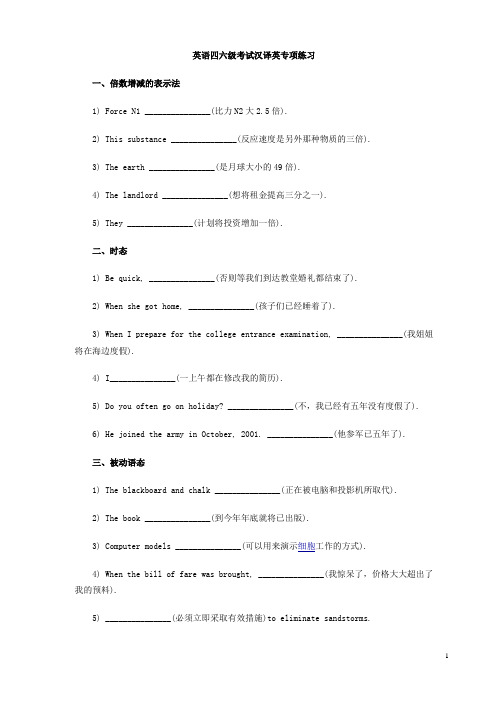
英语四六级考试汉译英专项练习一、倍数增减的表示法1) Force N1 _______________(比力N2大2.5倍).2) This substance _______________(反应速度是另外那种物质的三倍).3) The earth _______________(是月球大小的49倍).4) The landlord _______________(想将租金提高三分之一).5) They _______________(计划将投资增加一倍).二、时态1) Be quick, _______________(否则等我们到达教堂婚礼都结束了).2) When she got home, _______________(孩子们已经睡着了).3) When I prepare for the college entrance examination, _______________(我姐姐将在海边度假).4) I_______________(一上午都在修改我的简历).5) Do you often go on holiday? _______________(不,我已经有五年没有度假了).6) He joined the army in October, 2001. _______________(他参军已五年了).三、被动语态1) The blackboard and chalk _______________(正在被电脑和投影机所取代).2) The book _______________(到今年年底就将已出版).3) Computer models _______________(可以用来演示细胞工作的方式).4) When the bill of fare was brought, _______________(我惊呆了,价格大大超出了我的预料).5) _______________(必须立即采取有效措施)to eliminate sandstorms.四、情态动词1) The phone is ringing, _______________(但是没人接听。
英语六级翻译练习题库

英语六级翻译练习题库Part I: English to Chinese1. The economic development of a country can be measured by its gross domestic product (GDP) per capita.一个国家的经济发展可以通过其人均国内生产总值(GDP)来衡量。
2. Globalization has brought about significant changes in various aspects, including economy, culture, and communication.全球化在经济、文化和交流等多个方面带来了重大变革。
3. Climate change is a pressing issue that requires immediate attention from governments around the world.气候变化是一个紧迫的问题,需要全球各国政府立即关注。
4. With the advancement of technology, the way we live and work has been greatly transformed.随着技术的进步,我们的生活和工作方式发生了巨大的转变。
5. Education plays a crucial role in the development and progress of a society.教育在社会的发展和进步中起着至关重要的作用。
6. The Internet has revolutionized our daily lives and has become an indispensable tool for information gathering and communication.互联网彻底改变了我们的日常生活,已经成为了不可或缺的获取信息和交流的工具。
大学英语六级翻译考试习题
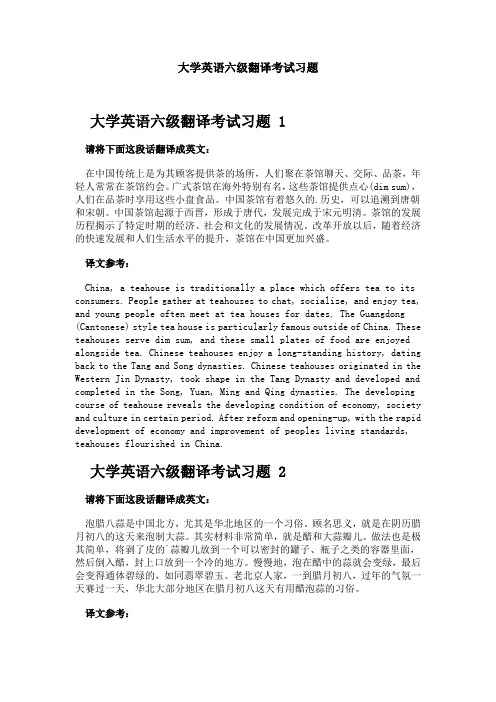
大学英语六级翻译考试习题大学英语六级翻译考试习题 1请将下面这段话翻译成英文:在中国传统上是为其顾客提供茶的场所,人们聚在茶馆聊天、交际、品茶,年轻人常常在茶馆约会。
广式茶馆在海外特别有名,这些茶馆提供点心(dim sum),人们在品茶时享用这些小盘食品。
中国茶馆有着悠久的.历史,可以追溯到唐朝和宋朝。
中国茶馆起源于西晋,形成于唐代,发展完成于宋元明清。
茶馆的发展历程揭示了特定时期的经济、社会和文化的发展情况。
改革开放以后,随着经济的快速发展和人们生活水平的提升,茶馆在中国更加兴盛。
译文参考:China, a teahouse is traditionally a place which offers tea to its consumers. People gather at teahouses to chat, socialize, and enjoy tea, and young people often meet at tea houses for dates. The Guangdong (Cantonese) style tea house is particularly famous outside of China. These teahouses serve dim sum, and these small plates of food are enjoyed alongside tea. Chinese teahouses enjoy a long-standing history, dating back to the Tang and Song dynasties. Chinese teahouses originated in the Western Jin Dynasty, took shape in the Tang Dynasty and developed and completed in the Song, Yuan, Ming and Qing dynasties. The developing course of teahouse reveals the developing condition of economy, society and culture in certain period. After reform and opening-up, with the rapid development of economy and improvement of peoples living standards, teahouses flourished in China.大学英语六级翻译考试习题 2请将下面这段话翻译成英文:泡腊八蒜是中国北方,尤其是华北地区的一个习俗。
大学英语六级翻译(整理)全
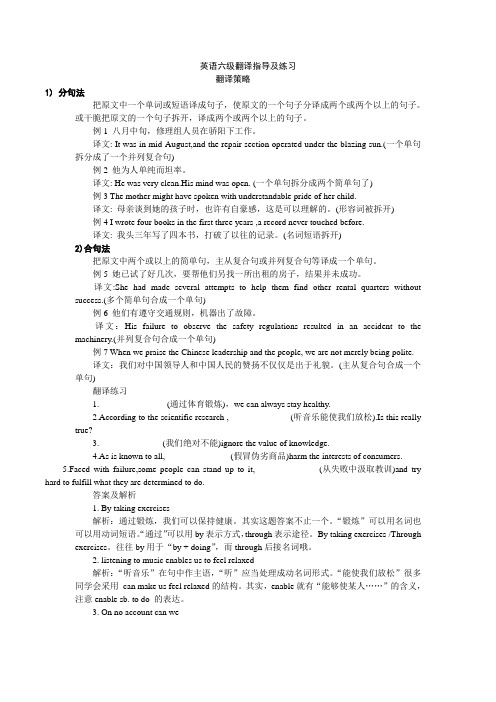
英语六级翻译指导及练习翻译策略1) 分句法把原文中一个单词或短语译成句子,使原文的一个句子分译成两个或两个以上的句子。
或干脆把原文的一个句子拆开,译成两个或两个以上的句子。
例1 八月中旬,修理组人员在骄阳下工作。
译文: It was in mid-August,and the repair section operated under the blazing sun.(一个单句拆分成了一个并列复合句)例2 他为人单纯而坦率。
译文: He was very clean.His mind was open. (一个单句拆分成两个简单句了)例3 The mother might have spoken with understandable pride of her child.译文: 母亲谈到她的孩子时,也许有自豪感,这是可以理解的。
(形容词被拆开)例4 I wrote four books in the first three years ,a record never touched before.译文: 我头三年写了四本书,打破了以往的记录。
(名词短语拆开)2)合句法把原文中两个或以上的简单句,主从复合句或并列复合句等译成一个单句。
例5 她已试了好几次,要帮他们另找一所出租的房子,结果并未成功。
译文:She had made several attempts to help them find other rental quarters without success.(多个简单句合成一个单句)例6 他们有遵守交通规则,机器出了故障。
译文:His failure to observe the safety regulations resulted in an accident to the machinery.(并列复合句合成一个单句)例7 When we praise the Chinese leadership and the people, we are not merely being polite.译文:我们对中国领导人和中国人民的赞扬不仅仅是出于礼貌。
大学英语六级翻译练习题带答案
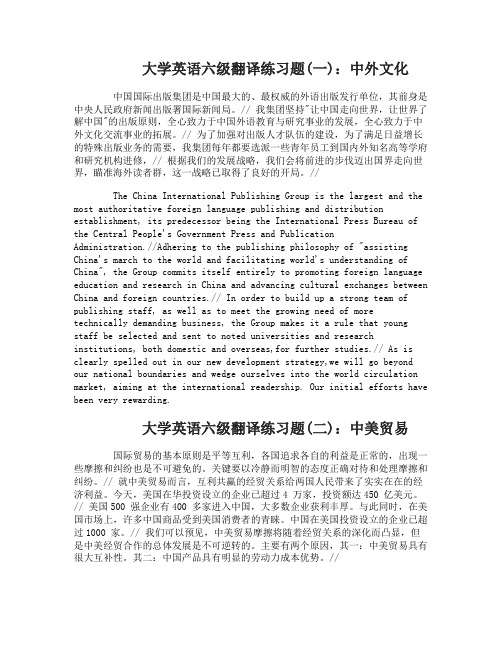
大学英语六级翻译练习题(一):中外文化中国国际出版集团是中国最大的、最权威的外语出版发行单位,其前身是中央人民政府新闻出版署国际新闻局。
// 我集团坚持"让中国走向世界,让世界了解中国"的出版原则,全心致力于中国外语教育与研究事业的发展,全心致力于中外文化交流事业的拓展。
// 为了加强对出版人才队伍的建设,为了满足日益增长的特殊出版业务的需要,我集团每年都要选派一些青年员工到国内外知名高等学府和研究机构进修,// 根据我们的发展战略,我们会将前进的步伐迈出国界走向世界,瞄准海外读者群,这一战略已取得了良好的开局。
//The China International Publishing Group is the largest and the most authoritative foreign language publishing and distribution establishment, its predecessor being the International Press Bureau of the Central People's Government Press and PublicationAdministration.//Adhering to the publishing philosophy of "assisting China's march to the world and facilitating world's understanding of China", the Group commits itself entirely to promoting foreign language education and research in China and advancing cultural exchanges between China and foreign countries.// In order to build up a strong team of publishing staff, as well as to meet the growing need of moretechnically demanding business, the Group makes it a rule that young staff be selected and sent to noted universities and research institutions, both domestic and overseas,for further studies.// As is clearly spelled out in our new development strategy,we will go beyond our national boundaries and wedge ourselves into the world circulation market, aiming at the international readership. Our initial efforts have been very rewarding.大学英语六级翻译练习题(二):中美贸易国际贸易的基本原则是平等互利,各国追求各自的利益是正常的,出现一些摩擦和纠纷也是不可避免的。
六级英语考试翻译习题及参考翻译.doc
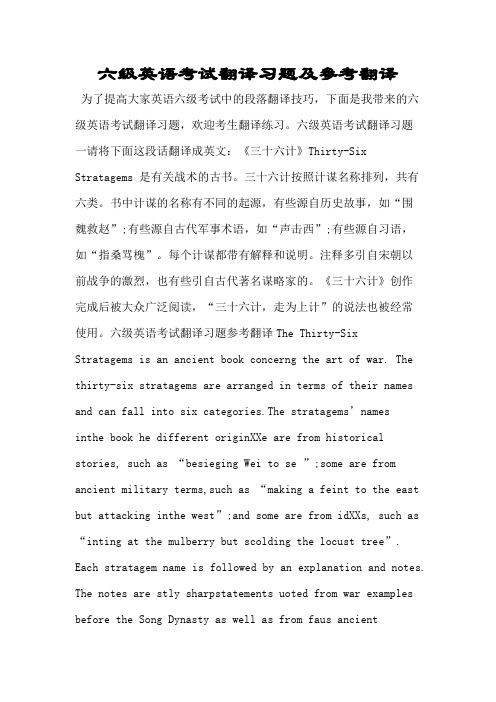
六级英语考试翻译习题及参考翻译为了提高大家英语六级考试中的段落翻译技巧,下面是我带来的六级英语考试翻译习题,欢迎考生翻译练习。
六级英语考试翻译习题一请将下面这段话翻译成英文:《三十六计》Thirty-Six Stratagems 是有关战术的古书。
三十六计按照计谋名称排列,共有六类。
书中计谋的名称有不同的起源,有些源自历史故事,如“围魏救赵”;有些源自古代军事术语,如“声击西”;有些源自习语,如“指桑骂槐”。
每个计谋都带有解释和说明。
注释多引自宋朝以前战争的激烈,也有些引自古代著名谋略家的。
《三十六计》创作完成后被大众广泛阅读,“三十六计,走为上计”的说法也被经常使用。
六级英语考试翻译习题参考翻译The Thirty-SixStratagems is an ancient book concerng the art of war. The thirty-six stratagems are arranged in terms of their names and can fall into six categories.The stratagems’namesinthe book he different originXXe are from historical stories, such as “besieging Wei to se ”;some are from ancient military terms,such as “making a feint to the east but attacking inthe west”;and some are from idXXs, such as “inting at the mulberry but scolding the locust tree”. Each stratagem name is followed by an explanation and notes. The notes are stly sharpstatements uoted from war examples before the Song Dynasty as well as from faus ancientstrategists. After the sition of the Thirty-Six Stratagems, it has been widely read in thegeneral public and the phrase “of all thirty-six stratagems, fleeing is the best” is also freuently used.1.有关战术的古书:可译为an ancient book concerng the art of war。
大学生英语四六级翻译

主要内容
综述 2.样题分析 3.三大考点
1.
综述
考试的最后一个阶段是翻译,5分钟处理5个句子。 特点是: 一,考题只考查汉译英,没有英译汉。
二,内容单纯,只是一般的短句翻译,没有大主 题语境,不需要专业理论知识。 三,名为翻译,实为补全句子,考查语法结构和 词组运用知识。每句只涉及15个左右的英语词, 需添入的部分也只有3到8个单词,其中隐含着四 级水平考生应当掌握的句型、语法、词组知识点。
6级真题练习
(6级-07.12)86. The witness was told that under no circumstances ____________________(他都不应该对法庭说谎). 86. should he lie to the court / is he allowed to lie to the court (08.6—6级) 85. Never once ______________(老 两口互相争吵) since they were married 40 years ago. have the old couple quarreled with each other(6级-09.12)86. Much ____________(我感到遗 憾), I was unable to finish the work on time. 86. regretful did I feel
(6级-10.6)84. He assured his friend that under no circumstances ____________ (他会违 背还钱的承诺). 84. would he break his promise to pay the money back.
- 1、下载文档前请自行甄别文档内容的完整性,平台不提供额外的编辑、内容补充、找答案等附加服务。
- 2、"仅部分预览"的文档,不可在线预览部分如存在完整性等问题,可反馈申请退款(可完整预览的文档不适用该条件!)。
- 3、如文档侵犯您的权益,请联系客服反馈,我们会尽快为您处理(人工客服工作时间:9:00-18:30)。
本文由莎咪D贡献
doc文档可能在WAP端浏览体验不佳。建议您优先选择TXT,或下载源文件到本机查看。 之很全)
大学英语六级考试 CET6 中翻译共有 5 句话。翻译分值占卷面总分 5%。我们的目标是全拿!英语六级翻译 高分指导及练习大全系列文章中会给大家介绍一些翻译策略和应试技巧,相信对大家做题有所帮助。精品 网祝各位朋友们考试顺利! [1] 翻译题的做题策略及练习 [2] 答案和详解 应试技巧 汉语主动句译成英语被动句 我们在汉译英时,往往也需要把汉语主动句译成被动句。这是因为:为了保证上下文连贯,使衔接更 紧密,句子更自然;或强调动作承受者;或使语气婉转、措辞恰当。具体转换方法有如下两种。 1)把汉语主动句的宾语译成英语被动句的主语。 例 1 (将领你们去参观我们的新车间)by the secretary. 译文:You will be shown our new workshop. 简评:如果这句话不是划线填内容,你完全可以将它翻译成 The secretary will show you our new workshop。正是因为题型是补全句子,这就给翻译带来了一定的难度,你必须去适应题型要求而不是让题 型来适应你。让我们看看译文已给出部分:by the secretary 显然是一个被动语态特征,"秘书"在译文里已经 由原来的主语变成了译文句子的补足成分。所以,题目是暗示我们要把原句中"你们"转换成译句里的主语, 这样才符合出题要求。 例 2 You (我们期待你能组织贸易推广活动)this time. 译文:are expected to organize the trade publicity campaigns. 简评:根据题目可推知全句意思是:我们期望你能组织这次的贸易推广活动。中文句子主语、谓语、 宾语分别是:我们、期望、你。但是在英文译文的给出部分中我们看到句子以 you 开头,也就是说"你被期 望能组织这次贸易推广活动"。中文的宾语变成了英文的主语,这就要求我们在翻译时要使用被动语态。全 句完整答案是:You are expected to organize the trade publicity campaigns this time. 2)当汉语句以"我们"、"人们"、"大家"等泛指性代词作主语时,在翻译成英文的时候常常可以忽略主 语不译, 并把英文译句处理成被动语态。 处理后的英文译句往往带有 know, find, see, say, suppose, estimate, report,suggest,stress,consider,expect,admit,point,understand 等动词。 例 3 如果原子失去一个或多个电子,我们就说这个原子带正电荷。 译文:If one or more electrons are removed,the atom is said/believed/thought to be positively charged. 简评:这句话是一个条件从句。即:在原子失去一个或多个电子的情况下,这个电子带正电荷。"我们 就说这个原子带正电荷"可理解为"这个原子被认为/ 被确信/ 被说成是带正电荷"。那么根据前面所说的原 则,我们在翻译时可以将泛指性主语"我们"省略不译,并使用被动语态。 从这个例子里我们还可以看出,在科技文章中,根据英语表达习惯我们应当多采用被动语态,以强调 事物的客观性。 例 4 人们采用各种措施来防止腐蚀。 译文:All kinds of measures are taken to prevent corrosion. 简评:这句话可以按原文译成主动态,即:People have taken all kinds of measures to prevent corrosion。 也可以用被动语态来翻译--All kinds of measures are taken to prevent corrosion。 两者比较而言, 被动态译文更 突出表明所有、种种措施已经付诸实施,all kinds of measures 得到强调,而主动态译法只是平铺直叙,重 点不突出。 此外,汉语句子中有"据说"、"据了解"、"据报道"、"据估计"、"据传言"等词语时,可以酌情译成相应 的英语被动句, It is supposed that 据推测……) It is said that 据说……) It is estimated that 据估计……) 如: ( , ( , ( , It is calculated that(预计……) is reported that(据报道……) is suggested that(有人建议) is stressed ,It ,It ,It
二、汉译英专项练习 一、倍数增减的表示法 1) Force N1 (比力 N2 大 2.5 倍).
2) This substance (反应速度是另外那种物质的三倍). 3) The earth (是月球大小的 49 倍). 4) The landlord (想将租金提高三分之一). 5) They (计划将投资增加一倍). 二、时态 1) Be quick, (否则等我们到达教堂时婚礼就已经结束了). 2) When she got home, (孩子们已经睡着了). 3) When I prepare for the college entrance examination, (我姐姐将在海边 度假). 4) I(一上午都在修改我的简历). 5) Do you often go on holiday? (不,我已经有五年没有度假了). 6) He joined the army in October, 2001. (他参军已五年了). 三、被动语态 1) The blackboard and chalk (正在被电脑和投影机所取代). 2) The book (到今年年底就将已出版). 3) Computer models (可以用来演示细胞工作的方式). 4) When the bill of fare was brought, (我惊呆了, 价格大大超出了我的预 料). 5) (必须立即采取有效措施)to eliminate sandy storms. 四、情态动词 1) The phone is ringing, (但是没人接听。她一定不在家). 2) I can’t find my sunglasses. (我可能昨天落在咖啡店里了). 3) You screamed in your sleep last night. (你一定梦见什么可怕的东西 了). 4) It’s a pity. (你本应该邀请她来参加你的毕业典礼的). 5) (其实我没必要穿上我最好的套装去参加那次聚会的); most of the guests were wearing jeans and sweaters. 五、虚拟语气 1) I wish (我年轻的时候有你们这样的机会). 2) If only (他知道这病是可以治好的)! Then he would not have killed himself. 3) —— Would you like him to paint your door with yellow stars? —— I’d rather he (漆成蓝色的,而且不带任何装饰). 4) It’s high time that (采取措施解决交通堵塞的问题). 5) Hugh usually talks (仿佛在大会上发表演说似的). 6) We insist that (让杰克立刻进医院). 7) It was advised that (在居民区设立更多的流动商店). 8) His proposal was that (他们成立一个专门委员会来检查这个问题). 9) We are going to discuss his suggestion that (取消期中考试). 10) It is ridiculous that (我们在一个总是下雨的国家还缺水). 11) It is essential that (每个人都为紧急情况做好准备). 12) (如果他按照我告诉他的办法订票), we would have had quite a comfortable journey. 13) I was to have made a speech (要不是有人把我的话打断了).
